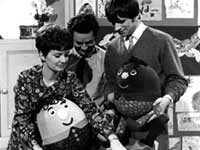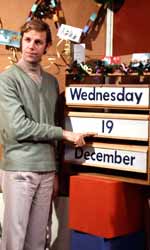 It was the pride of pre-school programming for a generation. A new combination of songs, dances, cheery presenters, and windows, swooping to the rescue of tired mums everywhere.
It was the pride of pre-school programming for a generation. A new combination of songs, dances, cheery presenters, and windows, swooping to the rescue of tired mums everywhere.
Play School is a fond, if blurry, memory for anyone in the prime of life today, as are the programme's hyper-enthusiastic presenters, like boffin Johnny Ball and feisty Floella Benjamin. Many a top childrens' TV career was started on Play School.
Beginning in 1964, the programme ran for over two decades, following more or less the same format throughout its life. It underwent just one, dodgily conceived, shake-up in the early '80s when the sets and focus were revamped, and even the title sequence was changed.
Play School took a different tack to entertaining children than the Watch with Mother style programmes that were the norm at its launch. It used real people rather than puppets, and spoke directly to the pre-schooler audience.
The emphasis was on fun rather than education, invoving much joining in with games and songs. The approach worked, with Play School regularly pulling audiences of five million during the '70s.

Most shows were studio-based, although the team occasionally got to go out to somewhere like a steam railway.
First there'd be the theme music, complete with space to shout what day it was. Then a general theme for the day would be introduced, like water, or dressing up. A song would follow, with plenty of opportunities for joining in, then a glance at the calendar and some malarkey with the toys.
Then it was onto one of the defining Play School moments - the telling of the time at the big clock. "If the short hand is on the two, and the long hand is on the twelve, so the clock says two o'clock!" Next came the eerie musicbox-like clock theme as cogs whirred and spun, and the camera panned slowly down to reveal a clue to the theme of the day's story.
Story over, and as excitement mounted for four-year-olds across Britain, it was time to go... through the window. Usually this was the square or round window, with the arched being a rare treat indeed.
Once through the window a short film would follow. It would be about making plates, building motorways or some such thing, accompanied with blindingly obvious narration along the lines of "It's a big yellow digger!"
Film over, it was back to the studio, and a final bit of pasting, painting or making before it was bye bye for that day.
Play School itself finally bid everyone bye bye in 1988. A few years earlier, the programme had been massively revamped in response to competition from ITV's childrens programmes, changing the titles, and becoming much more bright and colourful.
It wasn't bad, but by trying to appeal to slightly older children as well as tiny tots it alienated its audience. Further tweaks to the format in the mid-80s were too little, too late to bring back the audiences of Playschool's heyday. In 1988 the programme finally gave up its slot to Playdays.

